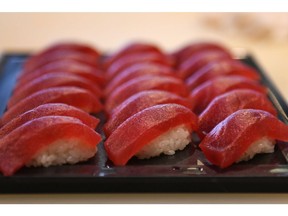
Article content
(Bloomberg) — China has lifted a 2023 ban on imports of seafood from most parts of Japan, removing an irritant in relations with its neighbor by starting to implement a deal reached last September.
THIS CONTENT IS RESERVED FOR SUBSCRIBERS ONLY
Subscribe now to read the latest news in your city and across Canada.
- Exclusive articles from Barbara Shecter, Joe O'Connor, Gabriel Friedman, and others.
- Daily content from Financial Times, the world's leading global business publication.
- Unlimited online access to read articles from Financial Post, National Post and 15 news sites across Canada with one account.
- National Post ePaper, an electronic replica of the print edition to view on any device, share and comment on.
- Daily puzzles, including the New York Times Crossword.
SUBSCRIBE TO UNLOCK MORE ARTICLES
Subscribe now to read the latest news in your city and across Canada.
- Exclusive articles from Barbara Shecter, Joe O'Connor, Gabriel Friedman and others.
- Daily content from Financial Times, the world's leading global business publication.
- Unlimited online access to read articles from Financial Post, National Post and 15 news sites across Canada with one account.
- National Post ePaper, an electronic replica of the print edition to view on any device, share and comment on.
- Daily puzzles, including the New York Times Crossword.
REGISTER / SIGN IN TO UNLOCK MORE ARTICLES
Create an account or sign in to continue with your reading experience.
- Access articles from across Canada with one account.
- Share your thoughts and join the conversation in the comments.
- Enjoy additional articles per month.
- Get email updates from your favourite authors.
THIS ARTICLE IS FREE TO READ REGISTER TO UNLOCK.
Create an account or sign in to continue with your reading experience.
- Access articles from across Canada with one account
- Share your thoughts and join the conversation in the comments
- Enjoy additional articles per month
- Get email updates from your favourite authors
Sign In or Create an Account
or
Article content
Beijing will allow the import of seafood products from most of Japan to resume, according to a statement from the General Administration of Customs on Sunday. Products from 10 prefectures including Fukushima will remain barred, according to the statement, as they have been since the meltdown of the Fukushima nuclear power plant in 2011.
Article content
Article content
Article content
That ban was extended to the rest of Japan in August 2023 after Tokyo announced it would start releasing wastewater from the wrecked power plant. Although the release had been approved by the International Atomic Energy Agency, China argued the release would contaminate the seas with radioactivity and render seafood caught off Japan unsafe for human consumption.
Article content
By signing up you consent to receive the above newsletter from Postmedia Network Inc.
Article content
The IAEA has continued to test water around the plant, with the most recent report released reiterating that “the discharges as planned would have a negligible radiological impact to people and the environment.”
Article content
China was one of the largest markets for Japanese seafood exporters and the ban has been a point of tension between the two countries.
Article content
“China’s opposition to Japan’s discharge remains unchanged,” Foreign Ministry spokeswoman Mao Ning said at a regular press briefing in Beijing on Monday. “We will continue to work with the international community to urge Japan to honor its commitments by taking long term actions and to effectively control the risks that come with the discharge.”
Article content
—With assistance from Colum Murphy.
Article content
(Updates with Foreign Ministry comments in final paragraph.)
Article content

.jpg) 9 hours ago
2
9 hours ago
2
 English (US)
English (US)